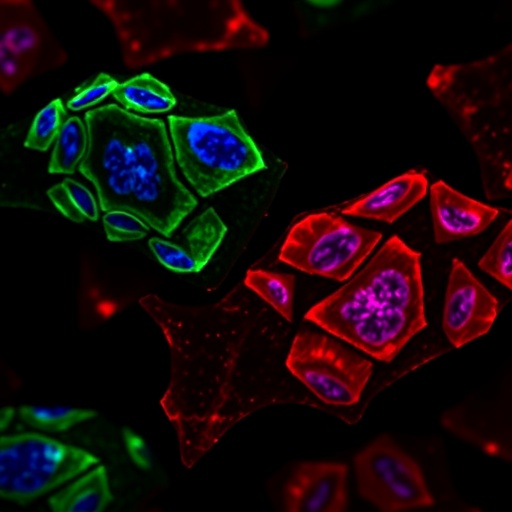In the ever-evolving field of biomedical research, the exploration of sex-based differences in immune responses presents a vital area of study. A recent investigation delves deeply into the intricate relationship between cell line-specific estrogen responses and functional sex differences in murine macrophages. This research, pioneered by Veintimilla, Turner, and Owusu-Boaitey, unveils critical insights that significantly enhance our understanding of how sex hormones influence immune system function and the underlying mechanisms.
The study emphasizes the role of macrophages, crucial players in the body’s immune defense, and their responses to estrogen—an essential hormone that plays a significant part in regulating various physiological processes. Researchers conducted an extensive analysis of murine macrophages to assess how different cellular environments affected estrogen signaling. This approach allowed for a nuanced exploration of sex differences, potentially paving the way for targeted therapeutic strategies that could leverage these hormonal effects.
A significant aspect of this research lies in its recognition of how traditional studies often overlook the influence of sex on cellular behavior, particularly in immune responses. Historically, research has predominantly focused on male subjects, leading to a vast knowledge gap regarding the physiological responses of females. By dissecting the cellular responses of macrophages derived from both sexes, the study seeks to illuminate these disparities, providing a more comprehensive view of immune function.
The researchers discovered that macrophages exhibit differential responses to estrogen, demonstrating varied functionality based on their cell line origin. This phenomenon signifies the necessity for further exploration of sex differences in macrophage biology. The findings illustrate that recognizing these differences can significantly impact the treatment of autoimmune diseases and inflammatory conditions, which often present differently in males and females.
In dissecting the mechanisms behind these variations, the study employed advanced molecular techniques to quantify the transcriptional changes within macrophages upon estrogen exposure. Results indicated that estrogen can modulate the expression of genes associated with inflammation and immune regulation distinctly across sexes. These observations underscore how cellular contexts and sex-based factors interplay in shaping immune responses, revealing a complex landscape that warrants further investigation.
Furthermore, the research highlights the importance of estrogen receptors in mediating these responses. Understanding how these receptors function differently between male and female macrophages could lead to novel interventions aimed at diseases that disproportionately affect women, such as certain types of autoimmune disorders or chronic inflammatory conditions. As researchers continue to unravel the molecular underpinnings of estrogen signaling, the potential for sex-specific medical therapies becomes increasingly feasible.
The broader implications of this research are profound, suggesting that immune interventions should consider sex as a significant variable instead of a mere background factor. This paradigm shift in how researchers and clinicians approach immune-related diseases could enhance treatment efficacy and patient outcomes, particularly in women who often experience different symptoms and responses to therapies than men.
As the scientific community navigates these findings, the importance of multidisciplinary collaboration is evident. Immunologists, endocrinologists, and pharmacologists must come together to comprehend the intricate mechanisms at play, forging pathways toward more effective, personalized treatment strategies. The collective efforts in this area can bring about significant advancements in how we treat not only autoimmune and inflammatory diseases but also how we approach health care disparities based on sex.
Given the pressing public health implications of understanding sex-based differences in immunity, proactive steps must be taken to fund and support research initiatives in this field. Increased awareness and appreciation for sex differences in immune responses could lead to policy changes that encourage more inclusive study designs in future biomedical research.
To effectively harness the knowledge gleaned from this study, the scientific community must prioritize education around sex differences in biology. Training programs and workshops that illuminate the fundamental principles of sex-based biology in research will be crucial to cultivating a new generation of scientists who recognize and value the nuances of this important field.
In summary, the work by Veintimilla and colleagues makes a significant contribution to our understanding of sex differences in immune system functioning, and particularly the role of hormones like estrogen in modulating these responses. As the research community continues to explore these intricate dynamics, the potential for innovative, sex-specific therapeutic approaches seems not just possible, but essential.
This study is a pivotal reminder that gender does not simply enhance biological variance—it is a critical determinant of health. Hence, as we stand at the brink of discoveries that can reshape the healthcare landscape, embracing these complexities will be key in driving forward a more equitable and effective approach to immunology.
Most importantly, the hope is that this rich understanding of sex differences will manifest in tangible benefits for patients, enabling more precise and effective treatment options that directly address the unique needs of both men and women in clinical settings. By unlocking the secrets held within murine macrophages, this research heralds a new era in our approach to immune health and disease management.
Subject of Research:
Differences in estrogen responses in murine macrophages and functional sex differences.
Article Title:
Cell line-specific estrogen responses uncover functional sex differences in murine macrophages.
Article References:
Veintimilla, A.M., Turner, Z., Owusu-Boaitey, N. et al. Cell line-specific estrogen responses uncover functional sex differences in murine macrophages. Biol Sex Differ 16, 75 (2025). https://doi.org/10.1186/s13293-025-00760-1
Image Credits:
AI Generated
DOI:
10.1186/s13293-025-00760-1
Keywords:
Sex differences, macrophages, estrogen, immune response, biomedical research.
Tags: estrogen responses in macrophagesestrogen signaling in immune cellsgender-specific immune system functionhormonal influences on macrophage functionimmune defense mechanisms in males and femalesimpact of sex on immune researchmacrophage cellular behavior differencesmurine macrophages and sex hormonesphysiological responses of female macrophagessex differences in immune responsessex-based differences in biomedical researchtargeted therapeutic strategies in immunology





